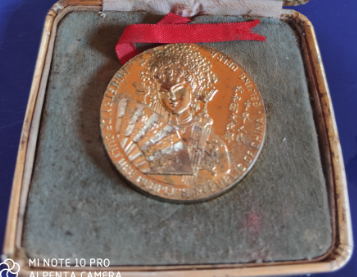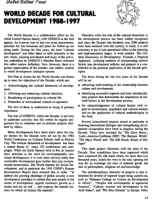| Highest bidder: |
Bidder 1
|
| Item Condition: | New |
| Seller Location: | Burkina Faso |
| Ends Within: |
closed 60 seconds will be added to the timer if a bid is received within 60 seconds before timer ends. |
| # of Bids: | 32 (View history) |
| USD Value: | US$6000 (for reference only) |
| Current Bid: | 15,020 YEM |
| Shipping Fee: | 100 YEM |
| This auction is closed | |
A Cultural Decade Reflections on the World Decade for Cultural Development 1988-1997 Maria Paola Goncalves G.
MINISTRY OF CULTURE PEOPLE'S REPUBLIC OF CHINA
As I remarked at the ceremony held to launch the World Decade for Cultural Development on 21 January 1988, the aim of the Decade is to promote awareness of the cultural imperative and to foster a new state of mind that will lead to the emergence of a variety of proposals devoted to "a diversity which unites, a ...
FOREWORD Cultural development or culture in development? The two notions are not incompatible. According to the definition that prevailed until the 1970s culture was the ‘sublimated’ reflection of human life, expressed chiefly through the arts. Developing culture meant promoting literature, painting, music, dance, drama - art forms that appealed directly to human sensibility. Protection of the ‘artistic heritage’ was likewise a key concern, and handicrafts were promoted as a traditional expression of culture. From the 1960s onwards, however, an awareness emerged of the need to transcend this narrow aesthetic notion of culture and to give more weight to its anthropological dimension. Concurrently, especially in so-called Third World countries, the fact that things were getting worse rather than better despite major international efforts to tackle the problems of underdevelopment set in motion a process of reflection. Development theories were constructed. The perception grew that it was vitally important to base development on sounder principles that incorporated a human dimension and took into account people’s innermost thoughts and feelings and their philosophy of life. At the ‘World Conference on Cultural Policies’ (MONDIACULT), held in Mexico City in 1982, it was thinkers and scholars who challenged the paradigms that had prevailed in the planning and implementation of development. They found, for example, that models developed by technical gurus, who were entirely unfamiliar with the circumstances for which they were intended, had been followed in many contexts and had proved a dismal failure. The consequences were extremely harmful because this zeal for ‘progress’ undermined the social fabric, resulting in a loss of values, undervaluing of the distinctive features of a separate personality and the adoption of alien and alienating paradigms. In many cases, enthusiasm for ‘modernity’ led to the disappearance of unique constituents of the cultural heritage of peoples, expressions of identity in which their historical memory was stored. It was further observed that the urge to measure development led to the application of purely quantitative economic parameters, an approach which ignored the fact that, where GDP (gross domestic product) or macroeconomic indices serve as the only yardstick, the human condition is overlooked. The MONDIACULT Conference challenged these models and stressed the need to focus on the human being as the measure of all things. Effective development of the individual and of society is possible only where the human being is viewed as subject and agent, and hence as the cornerstone of development. Real solutions to the problems besetting humankind call for recognition of its diversity and originality. As culture is the most authentic expression of human experience, its essential characteristics must be taken into account if the planning and implementation of development are to prove successful. Acting on proposals by the Member States which took part in the World Conference on Cultural Policies in Mexico City, the United Nations General Assembly approved the proclamation of a ‘World Decade for Cultural Development’ as a period for self-analysis during which countries would engage in a process of reflection, adopt policies and undertake activities designed to ensure the integrated development of their societies. The Decade began in 1988 and ended in 1997. Maria Paola Goncalves reviews the significance of the World Decade for Cultural Development. She skilfully analyses the evolution, fluctuations and different interpretations of the term ‘culture’, and goes on to explore existing theories of development. Looking back at the successes and failures of the past ten years, she examines the Decade’s impact on
Additional Information
|
Product Link: https://unesdoc.unesco.org/ark:/48223/pf0000114539_eng
Country: OUAGADOUGOU Burkina Faso (00226) Shipping Conditions: Buyer pays shipping expenses, International shipping
Payment Methods: PernumPay Starting Bid: 1 YEM Auction Started: 2021-02-24 11:47 Auction Ends: 2021-03-10 11:47 Auction ID: 4421 Item Category: All > Art & Antiques > Ancient World |
© 2018-2022 Shobbit, Inc.





